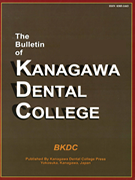- HOME
- > 一般の方
- > バックナンバー:The Bulletin of Kanagawa Dental College
- > 20巻2号
- > アブストラクト
アブストラクト(20巻2号:The Bulletin of Kanagawa Dental College)

English
| Title : | Effect of Potassium Gluconate on Potassium Transport in Rat Muscle : Its Extension to Aldosterone Excretion |
|---|---|
| Subtitle : | ORIGINAL ARTICLES |
| Authors : | Kasumi Kuse |
| Authors(kana) : | |
| Organization : | Department of Pharmacology, Kanagawa Dental College |
| Journal : | The Bulletin of Kanagawa Dental College |
| Volume : | 20 |
| Number : | 2 |
| Page : | 106-113 |
| Year/Month : | 1992 / 9 |
| Article : | Original article |
| Publisher : | Kanagawa Odontological Society |
| Abstract : | [Abstract] The effect of potassium gluconate (K-GL) on K+ transport of the rat extensor digitorum longus muscle was investigated. The reduced content of K+ in the muscle induced by 18 hr of cold (4℃) incubation was restored to the normal level when potassium chloride (KCl), potassium aspartate (Asp-K) and K-GL were present in the sequential incubation for 2 hr at 30℃; there was a significant difference between K-GL and KC1. The effect of K-GL, but not KCI and Asp-K, was not external glucose-dependent. The effect of potassium salts examined was completely abolished by the addition of ouabain. The inulin space, an extracellular fluid volume, and passive Na+ efflux of the muscle preparations were not affected by the potassium salts. Aldosterone excretion increased during the infusion of the potassium salts in dogs; the increase was independent of the form of potassium salt infused. Aldosterone production of the rat adrenal cortex was unaffected by the potassium salts. These results suggest that K-GL provides a substrate of glycolytic process and enhances active K+ transport of the skeletal muscle; and it is also postulated that the modification of passive Na+ leak pathway, extracellular fluid volume, and aldosterone synthesis and release are not responsible for the observed effect of K-GL. |
| Practice : | Dentistry |
| Keywords : | K-GL, K+ Transport, Skeletal Muscle, Na+, Aldosterone |
